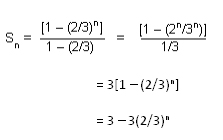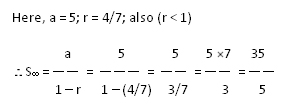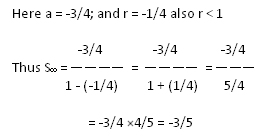Let us consider the G.P.
1, 2/3, 4/9, . . . .
The sum to n terms of this G.P. is:

What happens if the number of terms n becomes larger and larger?
Let us study the behavior of (2/3)n when n becomes sufficiently large.
n |
(2/3)n |
1 |
0.6667 |
5 |
0.13168724280 |
10 |
0.1734152992 |
20 |
0.00030072866 |
40 |
0.00000009043772695 |
We see that as n becomes larger and larger, (2/3)n becomes smaller and smaller and approaches zero.
Mathematically, we say that as n becomes sufficiently large, (2/3)n approaches zero. (Also note that although (2/3)n approaches zero, it is never equal to zero). We further say that sn approaches 3 as n becomes sufficiently large.
We write as n becomes sufficiently large as: (2/3)n → 0 and sn → 3. or as (2/3)n tends to 0 then sn tends to 3
In the above example, we observe that r < 1. In fact, it can be proven that if r < 1, as n becomes large, rn 0.
We have a G.P. whose first term is “a” and common ratio is “r”.

Since |r| < 1, rn → 0 and,  →0
→0
consequently,
Hence, sn = 
In other words, the sum of an infinite number of terms of a decreasing G.P. is a / (1 – r).
Briefly, we write the sum to infinity as a / (1 – r)
a
Thus, S ∞ = —— ( ∞ is the symbol for infinity)
1 - r
Examples
1) Find the sum to infinity of the G.P. 5, 20/7, 80/49, . . .
Solution:

2) Find S∞ for the G.P. -3/4, 3/16, -3/64, . . .
Solution:

We now have a beautiful application of the sum to infinity of a G.P. with r < 1.
We know that rational numbers have a given non-terminating recurring decimal on expansion.
For example, 2/3 = 0.666 - - -
We will use the sum of an infinite G.P. to find the rational number of a given non-terminating recurring decimal.
For example, take the number 0.333. . .
We can write this as 0.3 + 0.03 + 0.003 + . . .
It this the sum of an infinite G.P. with a = 0.3 and r = 0.1 (r < 1)
What is its sum?
0.3 0.3
It is = ——— = —— = 1/3
1 – 0.1 0.9

Try these questions
I) Find the following:
- Find the sum to infinity of the G.P. . 1/2, 1/4, 1/8, 1/16, 1/32, . . .
- Find a rational number, which when expressed as a decimal, will have as its expansion.
- Find a rational number, which when expressed as a decimal will have as its expansion.
II) Find S in the following G.P.
- 1, 1/3, 1/9, . . .
- 7, – 1, 1/7, – 1/49, . . .
- 6, 1.2, 0.24, . . .
- 50, 42.5, 36.125, . . .
- 0.3, 0.18, 0.108, . . .
- 10, – 9, 8.1, . . .
- 3, 1/3, 1/9, . . .
III) For each of the following decimals, find a rational number, which will have as its expansion .
- The first term of a G.P . is 2 and the sum to infinity is 6. Find the common ratio?
- The common ratio of a G.P. . is – 4/5 and the sum to infinity is 80/9. Find the first term?
- Find the sum of the series 1, 5, 25, . . .
- Find the sum of 2/3, 1/3, 1/6, . . .
- Find the sum of 1, 2/3, 4/9, . . . to infinity
Answers to Practice Problems
I) Find the following
- Find the sum to infinity of the G.P. . 1/2, 1/4, 1/8, 1/16, 1/32, . . .
Solution:
Here a = 1/2; r = 1/2 also r < 1
a
S = ——
1 – r
1/2 1/2
S = ——— = —— = 1
1 – 1/2 ½
- Find a rational number, which when expressed as a decimal, will have as its expansion.
Solution:
We write = 0.234444 . . .
= 0.23 + 0.004 + 0.0004 + . . .
a
Here a = 0.004; r = 0.1 we’ll use S = ——
1 – r
0.004
= 0.23 + ———
1 – 0.1
0.23 + 0.004 0.23 + 4
= ——— = ——
0.9 900
207 + 4
= ————
900
= 211/900
Thus this is the required rational number.
- Find a rational number, which when expressed as a decimal will have as its expansion
Solution:
We write = 1.56565656 . . .
= 1 + 0.56 + 0.0056 + . . .
0.56
= 1+ ———— (here a = 0.56; r = 0.01)
1 – 0.01
= 1 + 0.56/0.99
= 1 + 56/99
= 155/99.
II) Find S in the following G.P. .
- 1, 1/3, 1/9, . . .
Solution:
Here a = 1; r = 1/3
1 1
S = ——— = —— = 1 3/2 = 3/2
1 – 1/3 2/3
- 7, – 1, 1/7, – 1/49, . . .
Solution:
Here a = 7; r = – 1/7
7 7 7
S = ————— = ———— = ——
1 – (– 1/7) 1 + 1/7 8/7
= 7 7/8 = 49/8
- 6, 1.2, 0.24, . . .
Solution:
Here a = 6; r = 0.2
6
S = ——— = 6/0.8 = 60/8 = 7.5
1 – 0.2
- 50, 42.5, 36.125, . . .
Solution:
Here a = 50; r = 0.85
50 50
S = ——— = —— = 5000/15 = 333.3311:18 AM 9/18/2004–
1 – 0.85 0.15
- 0.3, 0.18, 0.108, . . .
Solution:
Here a = 0.3; r = 0.6
0.3
S = ——— = 0.3/0.4 = 3/4.
1 – 0.6
- 10, – 9, 8.1, . . .
Solution:
Here a = 10; r = – 9/10
10 10 10
S = ————— = ———— = ———
1 – (– 9/10) 1 + 9/10 19/10
= 10 10/19
5
= 5 —–
9
- 3, 1/3, 1/9, . . .
Solution:
Here a = 3:r = 1/9
3 3
S = ------------- = ------------- = 3 9/8 = 27/8
1 - 1/9 8/9
III) For each of the following decimals, find a rational number, which will have as its expansion
- The first term of a G.P. . is 2 and the sum to infinity is 6. Find the common ratio?
Solution:
Here a = 2; S = 6; r = ?
a
S = ——
1 – r
2
6 = ——
1 – r
6(1 – r) = 2
6 – 6r – 2 = 0
4 – 6r = 0
6r = 4
r = 4/6 = 2/3
- The common ratio of a G.P. . is – 4/5 and the sum to infinity is 80/9 find the first term?
Solution:
Here r = – 4/5; S = 80/9; a = ?
a
S = ————
1 – (–4/5)
80 a
—– = ———
9 1 + 4/5
80 a
—– = ———
9 9/5
80/9 = a 5/9
5a/9 = 80/9
5a = 80
a = 80/5 = 16
- Find the sum of the series 1, 5, 25, . . .
Solution:
Here a= 1; r = 5
S = 1 /(1– 5)
= 1/ –4
= –1/4>
- Find the sum of 2/3, 1/3, 1/6, . . .
Solution:
2/3
S = ———
1 – 1/2
2/3
= —— = 2/3 –2/1 = –4/3.
–1/2
- Find the sum of 1, 2/3, 4/9, . . . to infinity
Solution:
1
S = ———
(1 – 2/3)
1
= —— = 1 3/1 = 3.
1/3